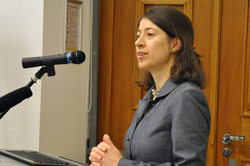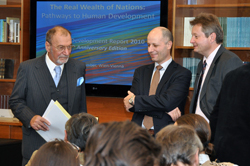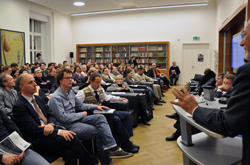



A presentation and panel discussion of the Human Development Report 2010 was co-organized by the United Nations Information Service (UNIS) Vienna and the Vienna Chapter of the Society for International Development (SID) in cooperation with the United Nations Development Programme and the Foreign Policy and United Nations Association of Austria, who hosted the event in Vienna on 25 November 2010. The title of the Report's 20th Anniversary Edition is "The Real Wealth of Nations: Pathways to Human Development".
The Report was presented by one of the lead authors - Isabel Pereira, Policy Specialist at the Research Unit of the UNDP Human Development Report Office. Ms. Pereira explained that the 2010 HDR Report looked back rigorously at past decades and identified trends and patterns, some of which were surprising but had important lessons for the future. The varied pathways to human development show that context matters and that there is no single formula for sustainable progress. Impressive gains can be achieved even without consistent economic growth.
The detailed presentation of the report was preceded with opening remarks by Thomas Nowotny, President of the Vienna Chapter of SID and Maher Nasser, Director, UNIS Vienna and followed by comments from Jens Wandel, Director, UNDP Bratislava Regional Centre. Wandel spoke about developments in the region covered by his Centre and the need to examine inequality and vulnerability not only in poor countries, but also in middle-income ones where the majority of the world's poor live. Wandel's comments were followed by remarks by panellists Robert Zeiner, Director of Programmes and International Projects of the Austrian Development Agency, Werner Raza, Director of the Austrian Research Foundation for International Development and Thomas Nowotny, President of the Vienna Chapter of SID.
According to the Report, the world's average Human Development Index had increased by 18 per cent since 1990, and by 41 per cent since 1970. This reflected large aggregate improvements in life expectancy, school enrolment, literacy and income. But there had also been considerable variability in experience and much volatility.
In response to the Report's title "The Real Wealth of Nations," all panellists emphasized the substantial change that the human development concept had introduced over the past two decades to the development paradigm by putting people at the centre of the development concept. Several audience members commented on the resulting dramatic changes they observed at their academic institutions to how the development subject was researched and taught. In the panel discussion, Werner Raza said that for him, it was only through the introduction of the Human Development concept that development studies had become really interesting. Thomas Nowotny commented that for him, the Human Development concept had "rescued the idea of progress", and drew attention to several examples of correlations between Human Development and indicators such as 'peacefulness' of states, environmental performance and even happiness of the population. Mr. Zeiner added that it was a timely moment to discuss the people-centred approach to development at a time when public debate focused on measures to rescue banks, large enterprises and states, but not people.
The discussion was attended by an audience of some 120 people from academia, non-governmental organization, government officials, international organizations, media and students
Video: UNDP Regional Centre Bratislava